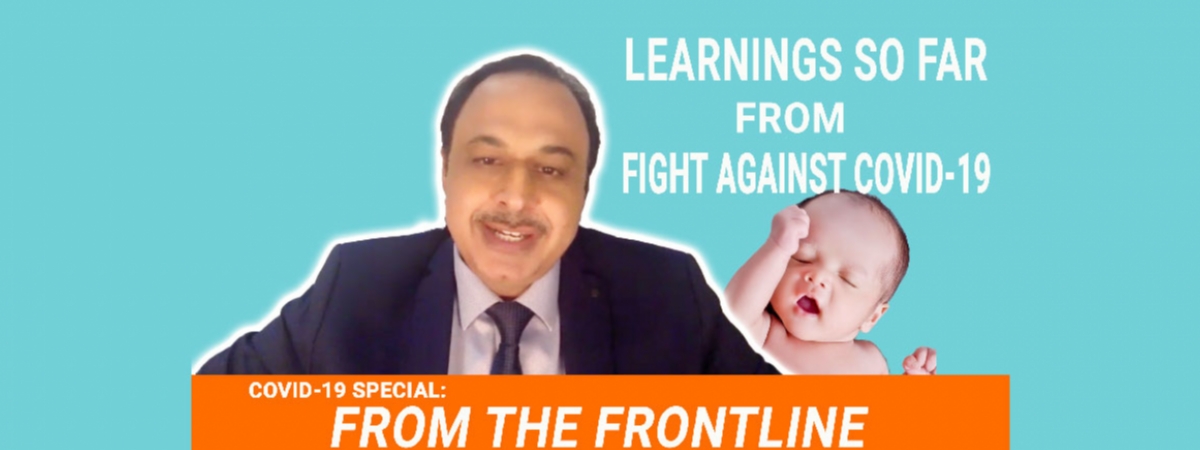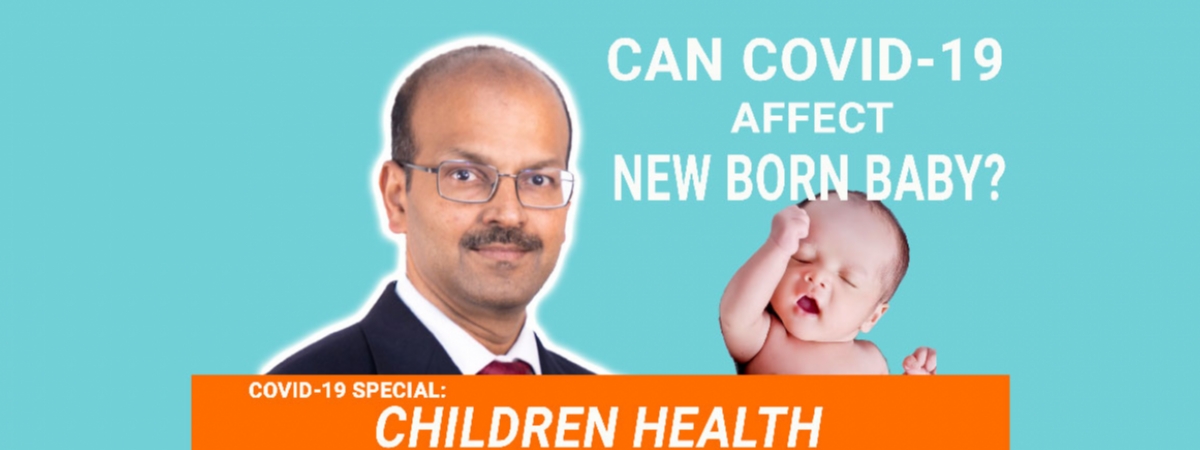COVID-19, Perfect Time to Start IVF Treatment?
10 May 2020
694 views
Dr Partha Das is a reproductive endocrinoloigist and Infertility & IVF specialist working at Orchid Fertility Clinic, DHCC.
We sat with him to listen to the latest updates on infertility treatments during COVID-19.
Movement restriction is easing up, can I start IVF treatment now?
Since March, we have been getting a lot of cases, new cases, cropping up in the United Arab Emirates, and all over the world, and nobody knew, what was the step forward. Now, the thing was, "to do or not to do". We as practitioners we have to fall back on guidelines and these guidelines are the best guidelines from the American Society of Reproductive Medicine in the US and the European Society from the UK. Now, these guidelines are very clear, that: do not start unless you are very clear about the effects of the Coronavirus effecting the pregnancy and the unborn child. With that note, we stalled our practice, the full month of March and April, we did not do any kind of fertility treatment. But yes, we were of course in the clinic attending to the patient’s needs, a lot of teleconsultations, online consultations, getting to know the history of patients and what they are going through because we want to talk to you and we spoke to them, whatever minutes, one hour over the phone, attended to their needs and if we felt there was a need for the patient or for the couple and do some tests or some scans then we used to call them. It was a quick in and out, scan or lab test and then they were back home and then we used to discuss the reports over the phone. So that was the scenario for the whole month of April. We were very conservative, we did not to do any fresh treatments.
Towards the end of April, the American Society as well as the European Society revised their guidelines and came up to say, 'listen, we can define the fertility treatment as an urgent care category for those people who wanted to start in March-Feb but got cancelled, you can start with those patients. For somebody who is undergoing cancer therapy and their eggs need to be frozen or their embryos need to be frozen, so for them you finish all those cases and you can go in for something called “freeze all” where you can freeze those embryos. Don’t be in a rush to put the embryos back. Give them some time, maybe 2 to 3 months, June-July when things are much better, go and place those embryos back, so we can achieve a healthy pregnancy as well as a successful outcome'.
So yes, now, starting from May onwards, we have started our ovulation induction, we are conducting IVF, we started doing the procedure. Now, when we have started doing those procedures, as you understand IVF is not a one-day treatment. It takes 15 to 20 days. So, we discuss with our patients; couples and ask them about their symptoms, if they have interacted with anybody that has any kind of symptoms, or if they have any kind of symptoms themselves, a fever, cough, cold and so on and so forth and if all those points are negative then we are subjecting the couple for nasopharyngeal swab and oropharyngeal swab to test for COVID-19 and once the report comes back negative, with that negative documented report, we start ovulation induction, IVF stimulation, and do the cycle and the retrieval.
If I contract Covid-19, how does it change ongoing IVF treatement?
Let’s say couple A have started the IVF stimulation and the treatment, now on the 7th or 8th day of injections, she comes and presents with a fever or not feeling so good, cough and cold. Because right now we are in the pandemic situation, the first thing which you have to suspect is that is he having Coronavirus? Is she a carrier or is she suffering from the same and we will immediately do the testing and the result will come in 24 to 48 hours so before we embark and continue her egg retrieval process under anaesthesia, we will get the report and if the report is positive of course we will be cancelling her whole cycle. In case, even if the report comes negative and she’s symptomatic, still we will go ahead and cancel her cycle because we don’t know after 1 week or 2 weeks down the line, she might be positive. So, yes she should not carry the stress of the whole treatment and become positive later on. So if any hints of fever, cough, cold or any symptoms, both the husband and wife, then yes we can cancel and they are well counselled and they are signing the consent saying that these things can happen and that they are aware of the consequences.
What is your advice to those currently considering IVF treatment during COVID-19?
I would like to start by saying the myth that 'we are free at home, nothing to do, let’s get pregnant' or 'let’s do some IVF treatment because this time we will never ever get'. That’s a myth. We should never ever think in that line. But, again having said that, that does not mean that you should not practice planning naturally, you can always get pregnant, in fact during this whole month of March and April we did a lot of teleconsultations and guided a lot of couples and they eventually got pregnant. So, if the husband and wife are absolutely healthy and they are following those precautions then yes, they can safely go ahead and try to get pregnant naturally, number 1. Number 2, if the need be they have to do any kind of ART procedures (Assisted Reproductive Technology) procedures like intrauterine insemination or in vitro fertilization procedures, then we do discuss with them the steps which I have mentioned that you have to be asymptomatic, you need to be doing the tests, you need to understand that today nobody knows the effect of the coronavirus on the pregnancy health and the unborn child.
Also, we have to understand that if we go back to February-March, a lot of ladies in Wuhan, China, they gave birth to babies and all those were successful outcomes in the sense that the mother was not affected much or the ladies who were affected did not transmit the virus to the baby and all the babies until date are good. Nobody has suffered any kind of consequences or negative ill effects on their health after the baby’s delivery.
So, coming back to the point: do I need to do the IVF treatment or the fertility treatment? Yes, if you follow these points as we have suggested, yes you can. If you are in that bracket that you have been waiting for a long time to get pregnant, you had started this process and you could not complete say in March, then yes you can start off in this process. It is safe to do it as of now. All over the world, American Socitey, European Society has not reported any untoward incident of this COVID-19 effect on the pregnancy and the child. So, it is case to case, individual to individual talk and counselling session we are holding. Either face-to-face or teleconsultation and once the patients are very very assured that everthing is fine then only do they step in.
Again, when they come to the clinic, we are not causing a traffic in the clinic, in the sense that we are restricting our appointments. Like if patient/couple A comes in, then by the time she goes, is the time for couple B to come in. They are not coming together, number 1. If there is a lot of people coming in, we ask them to wait in the parking lot in their car. Once we are free in the lobby, we call them upstairs and then we check them up. So, those are the precautions we are taking in the clinic. Safe practices, masks, frequent hand washing and not crowding the reception area too much.
*Disclaimer: Please consider the information in this video/article most recent as per date and medical recommendations towards COVID-19 may change as the situation evolves.
Comments
Other Articles
- The Best Prevention for Skin Aging is Education - 13 October 2020
- Learnings from the Frontline - 22 June 2020
- Can COVID-19 Affect New Born Babies? - 14 June 2020
- Traditional Indian Methods to Boost Your Immune System during COVID-19 - 11 June 2020
- Why Sudden Headache, Neck & Lower Back or Foot Pain While Working from Home? - 09 June 2020
- Does wearing mask mean death sentence for cosmetic dentistry? - 03 June 2020
- Aerosols are dangerous. Shall I delay dental treatments? - 03 June 2020
- Does COVID-19 mean no more braces with DIY Dentistry? - 01 June 2020
- Parents in Pandemic: How to Help Children Embrace the New Normal? - 29 May 2020
- Is it Safe to visit Dental Clinics during COVID-19? - 27 May 2020
- Skin Trouble After Wearing Face Masks? - 26 May 2020
- Parents in pandemic: how to keep children healthy and happy - 21 May 2020
- Severe Tooth Pain in the Middle of the Lockdown? - 20 May 2020
- Kids are very good COVID-19 carriers - 19 May 2020
- How pregnant women can boost their immune system during COVID-19 - 15 May 2020
- WORK FROM HOME? Beware of these Bone and Muscle Issues - 13 May 2020
- What happens to my braces? Orthodontic treatments during COVID-19 - 12 May 2020
- You can get Coronavirus through Eyes! Says Dubai Eye Doctor - 11 May 2020
- A Psychiatrist's Advice to UAE Moms During COVID-19 - 07 May 2020
- Dubai OBGYN explains Infertility Procedures during Covid-19 - 04 May 2020
- COVID-19 and Pregnancy in Dubai - 19 April 2020
- Good Vision Not a Sign of Healthy Eyes - 30 March 2020
- The Complete Guide for the Best Dental Implants in Dubai - 14 October 2019
- The A to Z of Braces and Aligners - 10 October 2019
- Why Teeth Brushing at Home is Not Enough? - 09 October 2019
- Everything You Need to Know About Veneers - 02 October 2019
- What Happens If You Neglect Gum Bleeding? - 26 September 2019
- Children Will Never Forgive You for the Toothache - 05 September 2019
- How Dental Implant Surgery can be Pain-free - 03 September 2019
- This Doctor May Solve Your Chronic Headaches - 18 August 2019
- Meet Dr Madhu Matthews at Mankhool Dental Clinic - 07 July 2019
- 5 Ways to Keep Your Skin Healthy in the Middle East - 16 April 2019
- A German Pediatrician’s Recipe for Healthier Children in Dubai - 03 April 2019
- The Right Moment to Consider Plastic Surgery - 03 April 2019
- Obesity is a Disease - 31 March 2019
- South Asians in Dubai Suffer the Most from Heart Disease - 10 March 2019
- Best Braces to Choose: Damon system or Invisalign - 09 March 2019
- Korean Dermatologist Debunks UAE Tap Water Myth - 14 February 2019
- Interview: A Surgeon’s Simple Approach to Complex Surgery - 03 February 2019
- Interview: A Dentist's Playlist for Beautiful Teeth - 23 January 2019
- Interview: This Chairman of a Medical Group Pioneered Keyhole Surgery in the UAE - 08 January 2019
- Interview: Husbands Are Unknowingly Making a Pregnancy Riskier - 07 January 2019
- Interview: How to Make Orthodontic Treatments Affordable? - 20 December 2018
- Interview: Psychiatric Approach to Happiness in Dubai - 20 December 2018
- Interview: The Psychology of Identity Loss in Dubai - 17 December 2018
- Interview: A Humanitarian Approach to Plastic Surgery - 16 December 2018
- Interview: Treat Infertility like Solving a Puzzle - 10 December 2018
- Interview: Dubai's Only Comedian Dentist - 10 December 2018
- Interview: A Holistic Approach to Gynecology in Dubai - 27 November 2018
- Interview: Treat Pain without Surgery - 26 November 2018
- Interview: Best Surgeon in Dubai 2017 - 22 November 2018
- Interview: UAE's Only Female Vascular Surgeon - 28 May 2017





Enter your comment below
Press 'ENTER' key to submit